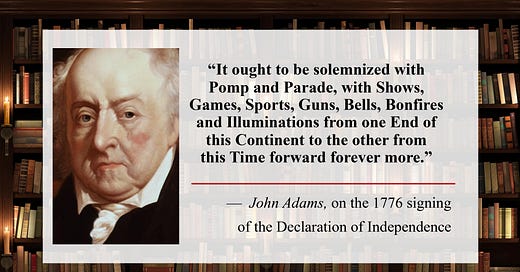Dr. Mardy's Quotes of the Week ("Declaring Your Independence")
June 30—July 6, 2024 | THIS WEEK: “Declaring Your Independence"
After the members of the Second Continental Congress approved and signed the Declaration of Independence in 1776, John Adams wrote about the occasion in a letter to his wife Abigail: “I am apt to believe that it will be celebrated by succeeding Generations as the great anniversary Festival.”
Adams went on to suggest that the signing of the Declaration …
Keep reading with a 7-day free trial
Subscribe to Dr. Mardy's Substack to keep reading this post and get 7 days of free access to the full post archives.



